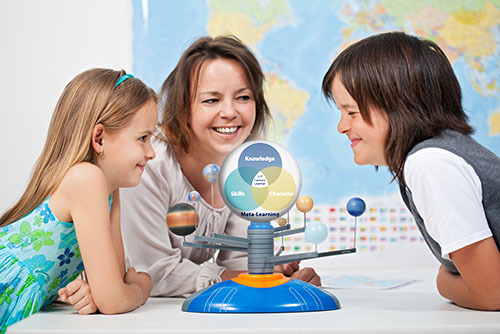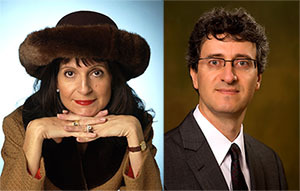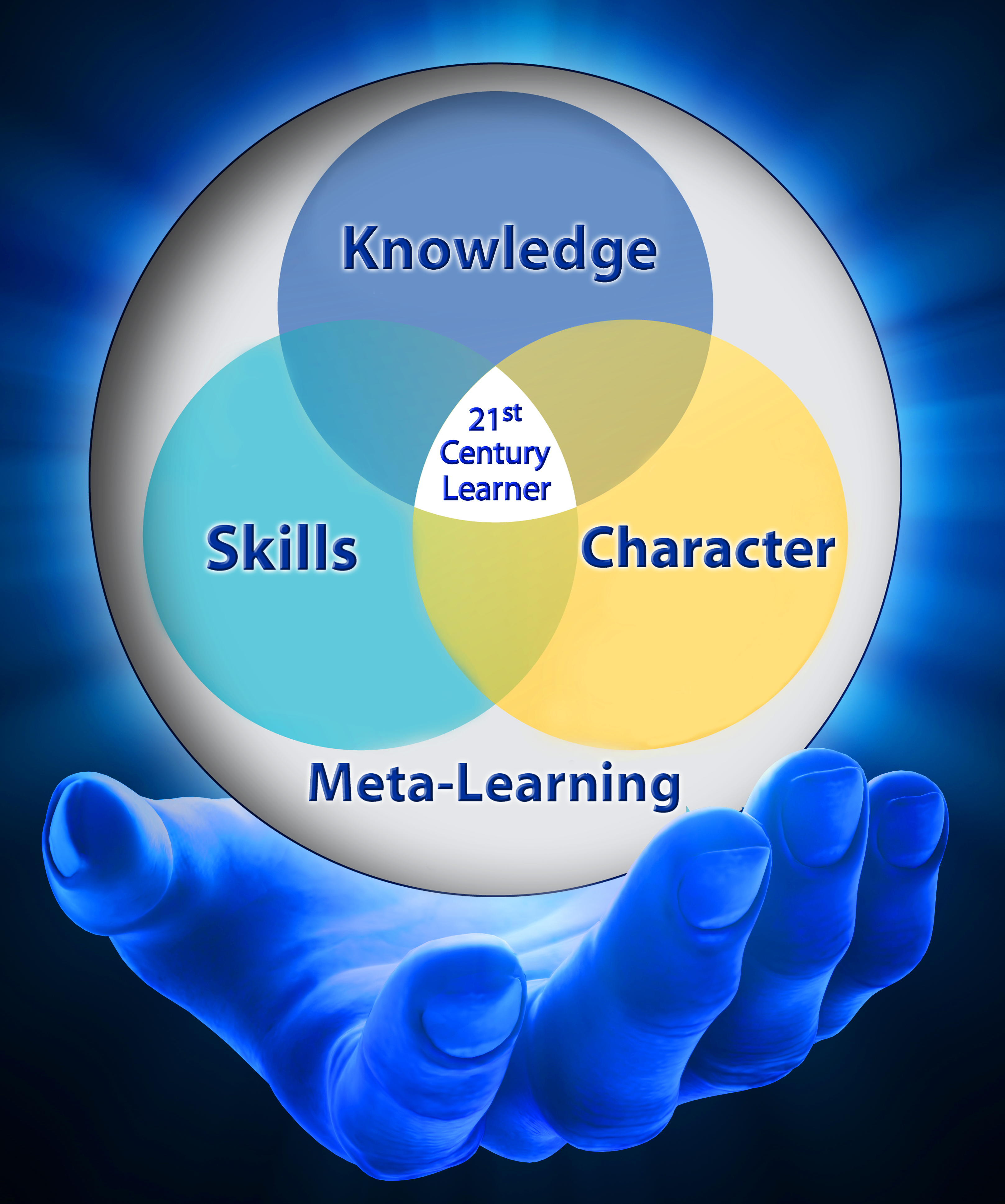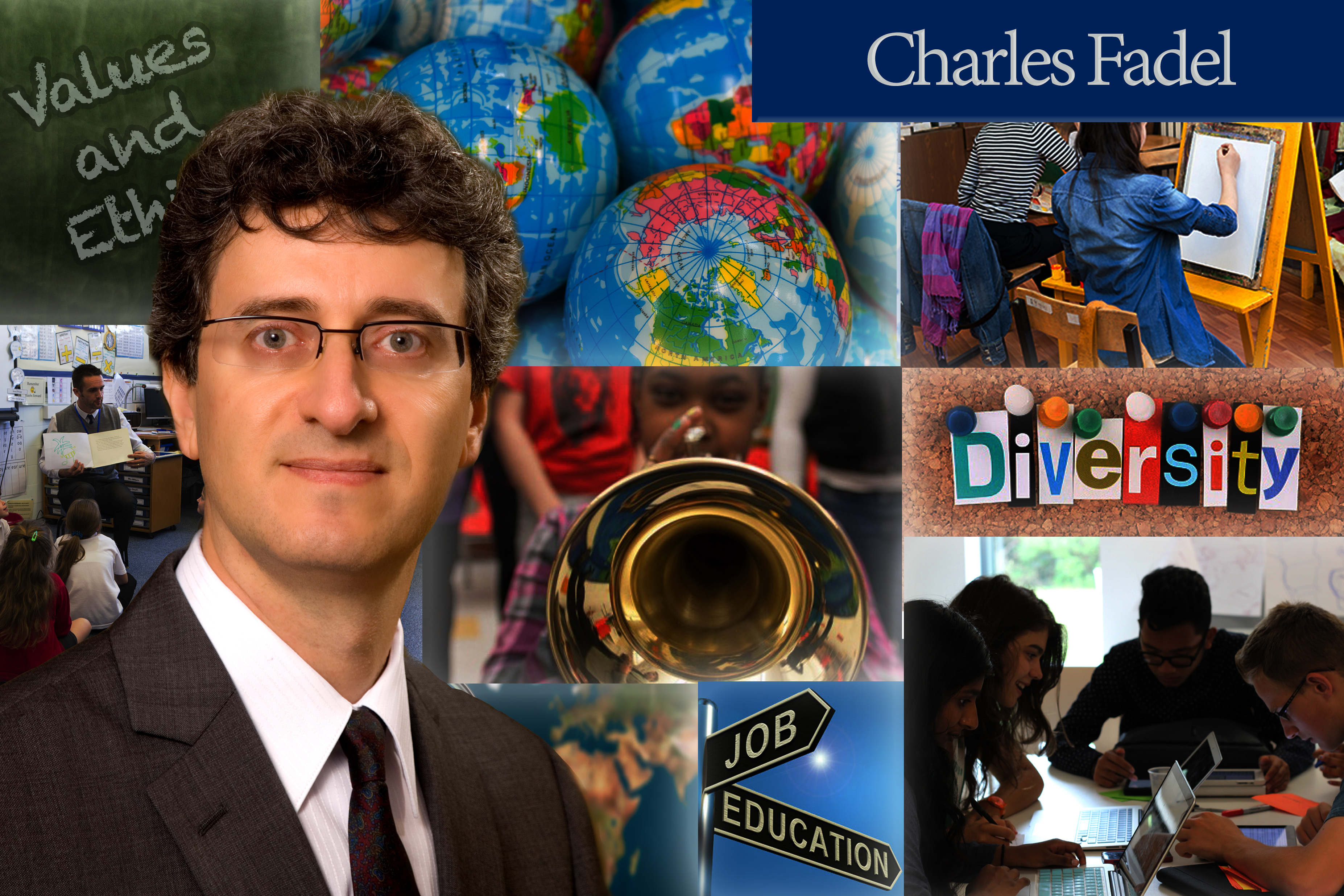
Los empleadores quieren contratar a personas con habilidades del siglo 21 y que no pueden encontrar suficientes candidatos calificados. El problema, dice Charles Fadel, Fundador del Centro de Rediseño Curricular, es que nuestro sistema de educación “está sesgada para los requisitos de ingreso a la universidad a través de pruebas como el SAT que son totalmente obsoletos, y nunca se refleja particularmente bien a las necesidades de la empleabilidad.” So given the dramatic transformations we are seeing in the workplace, ¿cuáles son las formas más efectivas para cerrar la brecha cada vez más la ampliación de la educación, al empleo?
Hoy en la Parte 4 de La Búsqueda Global para la Educación 5-serie de la parte con Charles Fadel, our focus is on skills. de la OCDE, Andreas Schleicher llama el libro de Fadel, De cuatro dimensiones Educación: Las competencias los estudiantes necesitan para tener éxito, un “primero de su marco organizativo tipo de competencias necesarias para este siglo que define los espacios en los que los educadores, los planificadores de programas, los responsables políticos y los alumnos pueden establecer lo que se debe aprender.”
Charles, how do you respond to employers’ concerns that students don’t have the skills needed to be productive in their companies?
For the past two decades, employers have stated that they are looking for employees able to display the “4 De C”: to think Critically – solve problems and draw sound decisions – as well as working Creatively, and able to Communicate and Collaborate on a systematic basis. This is the framework we developed at the Partnership for 21st Century Learning (P21).
We have seen surveys done by, entre otras, the Conference Board and P21, and BIAC at OECD, highlighting that the “4 C’s described above matter more than ever for employability the world over. This is not a new need, but it has been growing in importance as competition and time-to-market pressures intensify.
It is of course fair to say that employers expect from schools and higher education systems that students be ready for the world of work as well as world of life. They go hand-in-hand and there’s nothing wrong in educating for both employability and life. This is a false dichotomy as we need to educate for all levels of the Maslow pyramid: we all need to take care of physiological needs, but also safety, love/belonging, y auto-actualización.

¿Qué le diría a un recién graduado que trabajó duro en una institución muy caro y que no ha sido capaz de encontrar trabajo a tiempo completo con buenas prestaciones?
Primera, Yo diría que, “usted tiene toda mi simpatía, I am sorry the system did not offer you better guidance, particularly given the price you paid. Brands matter, por supuesto, but so do real skills, and the present system is focused on passing college, not really on employability.”
Then I’d say, “if you are still in college, make sure that you do many internships and projects with industry. And regardless of whether before or after graduation, realistically and honestly document how you have developed those real skills via each course, so you can discuss that during your interviews.”
Let’s talk about skills. What are the essential skills being left out of curriculum or that are not getting enough emphasis in curriculum?
Primera, let’s be clear in indicating that this is about skills not character qualities – these have been covered elsewhere before. The skills we are talking about are: creatividad, critical thinking communication, y la colaboración. They are essential for both the world of work and success in life.
Now of course, present-day education achieves a certain amount of that, with varying degrees of success. En primer lugar, there is the assumption that teaching a discipline will necessarily foster higher-order thinking skills. It is mostly unfounded, as fast and broad coverage of materials typically supercedes the deeper learning that needs to occur.
En segundo lugar, pedagogy needs to change – por ejemplo, it is hard to imagine how a passive listener would learn how to communicate and collaborate.
How do you see the importance of these skills in addressing the key trends and issues we are seeing globally, such as climate change and migration?
The global challenges we are facing require not just modern areas of knowledge, but how to use that knowledge effectively, which is what the 4C’s are about: how will we design water desalination systems? How will we foster entrepreneurship? Just about any contemporary question requires innovative and critical thinking. And it is also clear that communicating across cultures convincingly, and collaborating ethically and dynamically, are must-haves in an otherwise siloed world.

What are the primary drawbacks in the way current curriculum is organized in terms of developing the needed skills? Are these fundamental issues or constraints that are not overly challenging to modify?
Present-day curriculum in schools and higher education assumes that these skills will be naturally developed as the students acquired knowledge. But nothing can be further from the truth: knowledge can remain completely inert. Skills are how knowledge is used but one can learn in a rote way and never deepen skills.
A long-standing debate in education hinges on the false assumption that teaching skills will detract from teaching knowledge; this is a false dichotomy as studies have shown that when knowledge is learned passively without skills, it is often learned at the superficial level and therefore does not readily transfer to new environments. Deep understanding and actionability for the real world will occur only by embedding skills within the knowledge domain such that each enhances the other.
What steps need to be taken to better integrate the development of the essential skills into curriculum?
There are three steps that need to be taken to better integrate skills into the curriculum: Ante todo, re-examining the curriculum for obsolete areas so as to free up time and space for deeper learning to occur, hence skill development. Por ejemplo, if we are serious about using Mathematics to help develop creativity, this must allow for exploration and inquiry about various possibilities. Thus the need for time, which implies carefully curating topics of less importance. Segundo, the identification of which part of the curriculum is more suited for teaching which skill: every single discipline can cover every single skill deeply, but some are well-suited for specific skills, by their very nature: caricaturally perhaps, maths for critical thinking, language for communication, artes para la creatividad, etc. Y en tercer lugar, la formación de maestros para saber cómo activar esos mecanismos, en concierto con otros especialistas para ayudar a cabo sobre una base tema por tema, desde el interior como en el exterior de la escuela (incluidos los profesionales de la industria). No hay razón para que los educadores sean tan aislado.

Are there any subject areas that should receive greater emphasis to support the essential skill development process, por ejemplo. las artes, programación de computadoras, etc?
Cada materia o disciplina tiene la libertad para enseñar estas cuatro habilidades; se trata de una cuestión de pedagogía y cómo se usa el tiempo en el aula, to pay attention to not merely learning of knowledge but also how to apply that knowledge. Por ejemplo, one can use maths, if done right, to teach not only critical thinking, but also creativity, comunicación, y la colaboración.
How can employers and educators work together on skills?
Los empleadores tienen que permanecer involucrado en la toma de sus necesidades escuchadas, and education institutions have to accept that we educate for life and work, not only life – this is a false dichotomy. Life is difficult for most people without work, which brings not only income, but also self-esteem and satisfaction in making contributions.
Gracias Charles. En la Parte 5 de La Búsqueda Global para la Educación series with Charles Fadel, we will focus on WHAT Meta Learning?
Para obtener más información acerca De cuatro dimensiones Educación .
Para obtener más información acerca de la Centro de Rediseño Curricular.
(Todas las fotos son cortesía de CMRubinWorld y el Centro de Rediseño Curricular)


Únete a mí y reconocidos a nivel mundial los líderes de opinión, incluyendo a Sir Michael Barber (Reino Unido), DR. Michael Bloquear (EE.UU.), DR. Leon Botstein (EE.UU.), Profesor Clay Christensen (EE.UU.), DR. Linda Darling-Hammond (EE.UU.), DR. MadhavChavan (India), El profesor Michael Fullan (Canada), El profesor Howard Gardner (EE.UU.), El profesor Andy Hargreaves (EE.UU.), Profesor Yvonne Hellman (Países Bajos), Profesor Kristin Helstad (Noruega), Jean Hendrickson (EE.UU.), Profesor Rose Hipkins (Nueva Zelanda), Profesor Cornelia Hoogland (Canada), Honorable Jeff Johnson (Canada), Señora. Chantal Kaufmann (Bélgica), DR. EijaKauppinen (Finlandia), Secretario TapioKosunen Estado (Finlandia), Profesor Dominique Lafontaine (Bélgica), El profesor Hugh Lauder (Reino Unido), Señor Ken Macdonald (Reino Unido), Profesor Geoff Masters (Australia), Profesor Barry McGaw (Australia), Shiv Nadar (India), Profesor R. Natarajan (India), DR. PAK NG (Singapur), DR. Denise Papa (Estados Unidos), Sridhar Rajagopalan (India), DR. Diane Ravitch (EE.UU.), Richard Wilson Riley (EE.UU.), Sir Ken Robinson (Reino Unido), Profesor Pasi Sahlberg (Finlandia), El profesor Manabu Sato (Japón), Andreas Schleicher (PISA, OCDE), DR. Anthony Seldon (Reino Unido), DR. David Shaffer (EE.UU.), DR. Kirsten Immersive Are (Noruega), Canciller Stephen Spahn (EE.UU.), Yves Theze (LyceeFrancais EE.UU.), Profesor Charles Ungerleider (Canada), Profesor Tony Wagner (EE.UU.), Sir David Watson (Reino Unido), Profesor Dylan Wiliam (Reino Unido), DR. Marcos Wormald (Reino Unido), Profesor Theo Wubbels (Países Bajos), El profesor Michael Young (Reino Unido), y el profesor Zhang Minxuan (De China) a medida que exploran las cuestiones de educación cuadro grande que todas las naciones se enfrentan hoy.
La Búsqueda Global para la Educación Comunitaria Página
C. M. Rubin es el autor de dos ampliamente leído serie en línea por la que recibió un 2011 Premio Upton Sinclair, “La Búsqueda Global para la Educación” y “¿Cómo vamos a Leer?” Ella es también el autor de tres libros más vendidos, Incluido The Real Alice in Wonderland, es el editor de CMRubinWorld, y es una Fundación Disruptor Fellow.
Siga C. M. Rubin en Twitter: www.twitter.com/@cmrubinworld





Comentarios recientes